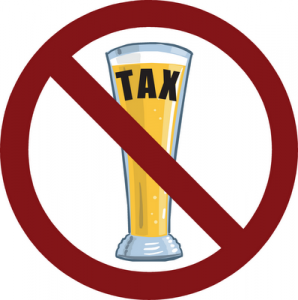I share a lot of economic theory and empirical evidence in favor of lower tax rates. And I’m constantly extolling the virtues of overall economic freedom.
But sometimes it helps to have a real-world example of how a specific industry responds when it is freed from onerous taxation and pointless regulation.
 Tom Acitelli explains in the Wall Street Journal how the American beer industry was rejuvenated by deregulation and tax cuts. Here are some excerpts from his column.
Tom Acitelli explains in the Wall Street Journal how the American beer industry was rejuvenated by deregulation and tax cuts. Here are some excerpts from his column.
As recently as 35 years ago, there were fewer than 50 breweries in the whole country… The story of the U.S. ascent to the top tier of world beer began in the late 1970s, when brewing was liberated from government taxation and regulation that had held it back since Prohibition. …The brewing industry had been trying unsuccessfully for years to get Washington to lower excise taxes on beer produced by smaller brewers. …H.R. 3605 cut the federal excise tax on beer to $7 from $9 per barrel on the first 60,000 barrels produced, so long as a brewery produced no more than two million barrels annually. …The tax cut unleashed a revolution in American brewing. Hundreds of smaller breweries began to open across the country selling what came to be called craft beer.
But the industry wasn’t held back just by taxation.
Some of the stars of American craft beer, such as Ken Grossman of Sierra Nevada and Sam Calagione at Dogfish Head, got their start with home brewing—an activity that until the late 1970s was illegal in the U.S. …the government did little to enforce the anti-home-brewing law. Still, the air of illegality discouraged many who might have taken up home-brewing… Enthusiasts in the U.S. kept their interests underground, usually sharing information only with a small circle of other home brewers. Who knew when the government might start enforcing the home-brewing prohibition? Gradually, though, the secretive home brewers grew bolder. …They lobbied…to introduce legislation legalizing home-brewing at the federal level. …legislation…was reconciled with a House bill in August 1978. President Carter signed the law that October, and it took effect the following February. Home-brewing of up to 200 gallons a year per household was suddenly permitted.
So what happened when economic liberty was legalized?
The result: Home-brewing took off, helping to spur the movement toward craft beer that had been touched off by the beer tax reduction. The beer industry swelled in the 1980s and 1990s, producing thousands of jobs and tens of millions of dollars in annual tax revenue. The rise of American beer wasn’t an accident. It was spurred by efforts to cut taxes and regulation that unleashed entrepreneurship. Too bad Washington doesn’t raise a toast to that idea more often.
The part about “millions of dollars in annual tax revenue” rubs me the wrong way, as I explained in a recent post about marijuana legalization in Colorado, but even an anti-taxer like myself recognizes that ending a form of prohibition is a net plus for freedom.
And I definitely like what Acitelli writes about applying more broadly the lessons of lower taxes and deregulation. Heck, if we’re good students and study hard, maybe some day we can be Hong Kong instead of France.

